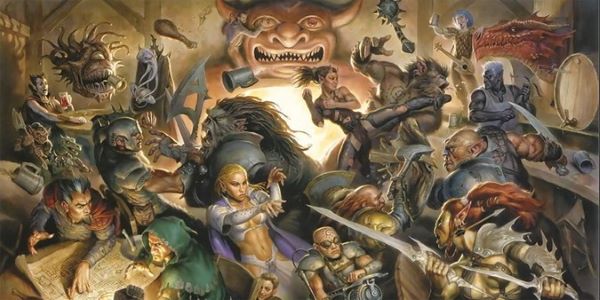While we all know that teamwork is a critical skill in the workplace, it’s not something that comes naturally to everyone. People entering the workforce for the first time often arrive with varying degrees of experience in collaborative environments. The ability to work in a team is developed through a range of experiences. These can range from group projects in school and college to participating in team sports and clubs. But what if there was a more engaging, dynamic way to learn teamwork skills? Enter Dungeons & Dragons (D&D)—a game that not only entertains but also teaches essential teamwork skills in a way few other activities can.
Group Projects in School
For many, school group projects are their first significant taste of teamwork. These projects often involve a diverse mix of randomly assigned individuals. All of whom must come together to achieve a common goal—completing an assignment or presentation. Both of my kids are going through this at the moment. Interestingly, their understanding of how teams work (and don’t) is already beginning to form.
- Experience: Students learn to divide tasks, manage time, and communicate effectively to ensure the project is completed on time.
- Challenges: Conflicts can arise when some members contribute less or when communication breaks down. In fact, these challenges provide valuable lessons in conflict resolution, leadership, and compromise.
Team Sports
Participation in team sports is a well known way to learn teamwork. Whether it’s soccer, ice hockey, or volleyball, team sports teach players the importance of trust, communication, and working together towards a shared objective. With my own kids sports teams, it has been a joy to watch them progress from a bunch of individuals to a group that works as a team.
- Experience: Athletes quickly learn that individual talent is not enough; the team must function as a cohesive unit. Success comes from understanding each other’s strengths and weaknesses and playing to those strengths.
- Challenges: The fast-paced nature of sports often requires split-second decisions that affect the entire team, reinforcing the need for clear communication and trust in one another’s abilities.
Club Participation
Clubs offer a different flavor of teamwork, often centered around shared interests or goals. Whether it’s a debate club, drama society, or environmental group, clubs provide a structured yet flexible environment for teamwork. Usually clubs have a strong purpose, which gives the group direction.
- Experience: Members often take on specific roles that contribute to the club’s overall success, such as organizing events, managing finances, or leading discussions.
- Challenges: Balancing individual initiative with group consensus is a common challenge, teaching members how to negotiate and collaborate effectively.

The Ultimate Way to Learn Teamwork: Dungeons & Dragons
While group projects, sports, and clubs all provide valuable teamwork experience, there’s another activity that really stands out: Dungeons & Dragons. This tabletop role-playing game might seem like just a game to outsiders. But, it’s a powerhouse for building teamwork skills. Here’s why:
- Collaborative Storytelling: In D&D, players create a shared narrative, with each person contributing to the story’s direction. Success is rarely achieved alone. Players work together solving problems, overcoming obstacles, and achieving their goals. This collaborative aspect mirrors real-world team dynamics, where success often depends on effective communication and mutual support.
- Role Differentiation and Cooperation: Every character in D&D has unique abilities and strengths, just like members of a workplace team. Players must understand their own role and how it complements others in the group. This dynamic teaches the importance of role differentiation, cooperation, and leveraging individual strengths for the benefit of the team.
- Problem-Solving Under Pressure: D&D scenarios often present complex challenges that require quick thinking and teamwork to resolve. The pressure to make decisions that affect the entire group, combined with the unpredictable nature of the game, mirrors the problem-solving demands of a fast-paced work environment.
RPGs in Graduate Programs
Given the immense benefits of roleplaying games like Dungeons & Dragons, incorporating them into graduate programs can provide unparalleled teamwork experiences. While new to the workforce, graduates are expected to collaborate on complex projects, manage time effectively, and navigate high-pressure situations. These are skills that are directly honed through playing RPGs.
By introducing D&D type sessions into your organizations graduate programs, students gain a unique opportunity to develop and refine their teamwork abilities. Teamwork under pressure is simulated in a dynamic, engaging, and ultimately, low-risk environment. These games encourage creativity, foster deep communication, and build strong, trust-based relationships among participants. Qualities that are invaluable in any professional setting.
Additionally, scenarios can be created that reflect common leadership issues faced by your organization. Albeit wrapped in a different genre.
While traditional activities like group projects, team sports, and clubs provide essential building blocks for teamwork, Dungeons & Dragons offers a uniquely powerful way to cultivate these skills. By embracing the collaborative and immersive nature of RPGs, new workers and students alike can learn the art of teamwork in a way that’s both fun and profoundly impactful.
All you leaders out there, why not talk to your learning and development team about incorporating D&D into your graduate program?

